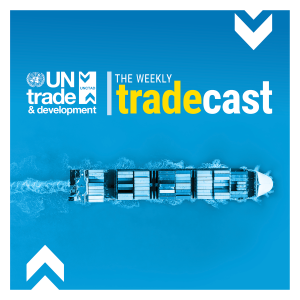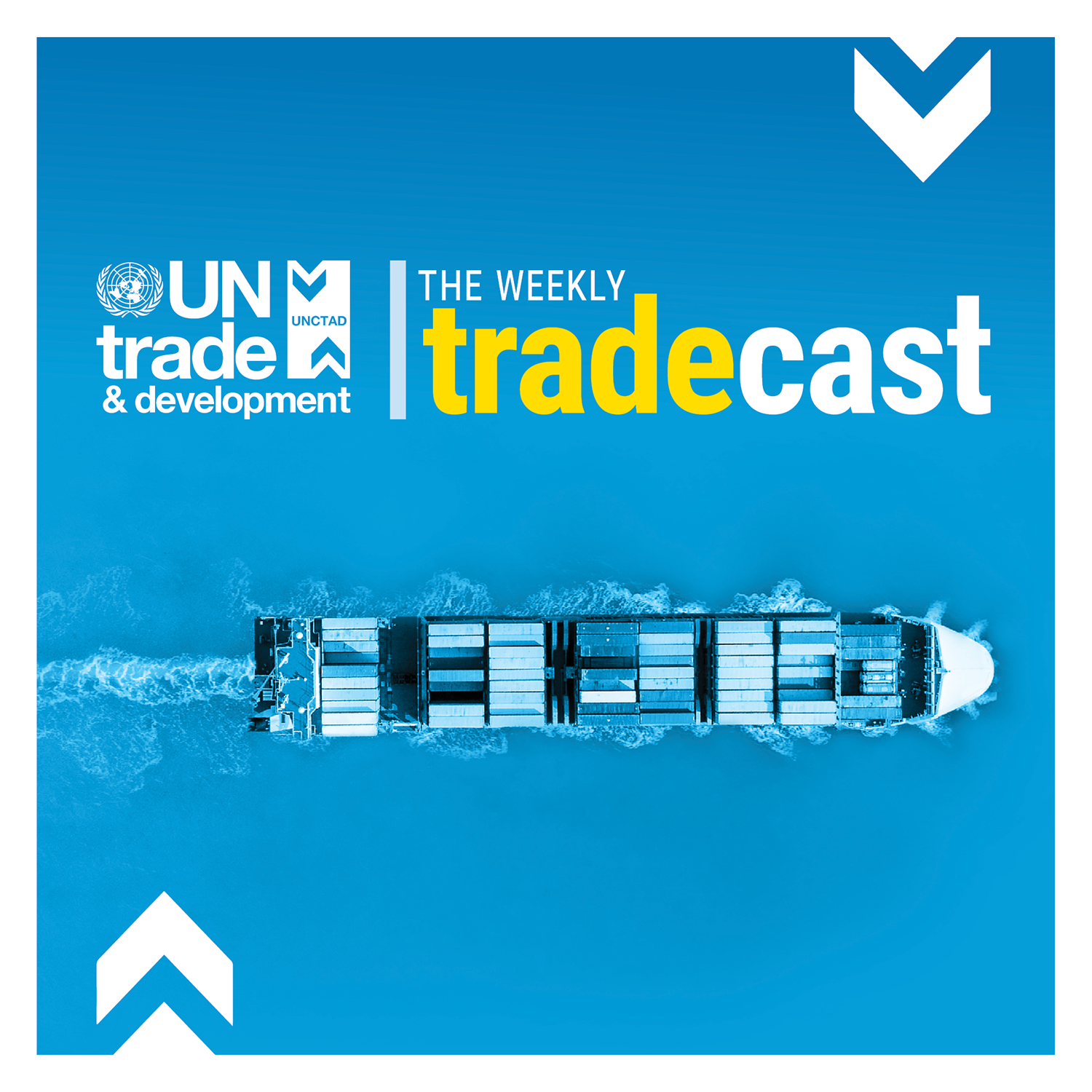Episodes
Episodes



Thursday Mar 14, 2024
86. Fisherman's blues: Why the fisheries industry needs to get much greener
Thursday Mar 14, 2024
Thursday Mar 14, 2024
This episode of The Weekly Tradecast looks at how we can fight climate change by cutting the carbon emissions of our fisheries with David Vivas, an UNCTAD legal officer working on trade and environmental issues.
The fishing industry is a vital source of food. And it provides work – directly or indirectly – for one in every 13 people on the planet.
But there's a deep downside for the environment from the emissions spewed out by the sector's ships and processing plants. One recent study shows that bottom trawling – a common fishing practice – emits as much carbon dioxide every year as airplanes.
How do we make fisheries greener while also keeping people in their jobs?
Listen in to UNCTAD’s David Vivas to find out how we can stay in line with global climate goals and cut down the carbon emissions of our fisheries.



Thursday Mar 07, 2024
85. Women’s Day: Why investing in women is the key to faster development for all
Thursday Mar 07, 2024
Thursday Mar 07, 2024
As we mark International Women's Day on 8 March, this episode of The Weekly Tradecast looks at the importance of investing in women with special guest Rebeca Grynspan, Secretary-General of UNCTAD, the UN’s trade and development body.
Overall, the outlook for gender equality is not as bright as it should be.
Women and girls make up nearly half of humanity but still lack equal opportunities in societies and economies. That means they often get less access to education and healthcare, are paid less than men and are more likely to leave work to care for families.
Projections now show that closing the global gender gap will take almost 132 years – about 30 years more than estimated in 2019, before the COVID-19 pandemic.
Tune in to UNCTAD Secretary-General Rebeca Grynspan to find out how inclusion, investment and opportunities for women support sustainable development, build economies and strengthen societies.



Thursday Feb 29, 2024
84. Money on the move: How remittances and trade work together for development
Thursday Feb 29, 2024
Thursday Feb 29, 2024
This episode of the Weekly Tradecast looks at the importance of remittances with UNCTAD economist Bruno Antunes.
Around the world, migrants send home more than $830 billion in remittances, of which about $650 billion go to developing countries, according to estimates from the World Bank.
That money helps to reduce poverty, improve nutrition and broaden access to education.
Listen in to Bruno Antunes to find out how policies and reforms can help us better use remittances and the opportunities they offer.



Thursday Feb 15, 2024
83. Precarious passage: Red sea ship attacks strain supply chains
Thursday Feb 15, 2024
Thursday Feb 15, 2024
This episode of The Weekly Tradecast looks at the impact on shipping, supply chains and trade from insecurity in the Red Sea with Jan Hoffman, head of UNCTAD's trade logistics branch.
About 80% of the world’s goods move by sea. But escalating attacks by Houthi rebels on ships passing through the narrow waters towards the Suez Canal have disrupted shipping routes and raised geopolitical tensions.
Red Sea shipping lanes carry around 15% of global trade but many ships have been diverted. UNCTAD estimates the trade volume going through the Suez Canal fell 42% over the last two months.
Without the Red Sea shortcut, longer routes between Asia and Europe add significant time and cost to shipments. That's fuelling fears of more shocks to the economy – with inflation still high and supply chains still shaky after disruptions during the pandemic.
Tune in to UNCTAD's Jan Hoffmann to find out more about the Red Sea disruptions and other threats to maritime trade from clogged shipping lanes and climate change.



Thursday Feb 08, 2024
82. Measuring what matters: Why inclusive growth means more than just GDP
Thursday Feb 08, 2024
Thursday Feb 08, 2024
This episode of The Weekly Tradecast looks at UNCTAD’s tool to measure sustainable growth and some of the signs of progress with Anu Peltola, who is in charge of the organization’s statistics unit.
For nearly 80 years, gross domestic product (GDP) has been the headline number to measure a country’s prosperity.
To get a more detailed picture, UNCTAD's Inclusive Growth Index goes further by combining GDP with other data on living conditions, equality and environmental sustainability. Launched in 2022 and expanded last year, the index now covers 93% of the world’s people and 96% of the global economy.
On average, developed countries score nearly twice as high as developing countries for inclusive growth. But some gaps are getting smaller.
Tune in to UNCTAD’s Anu Peltola to find out where and why.



Wednesday Jan 31, 2024
Wednesday Jan 31, 2024
This episode of The Weekly Tradecast looks at the impact of the Israel-Gaza crisis on the Palestinian economy with UNCTAD economist Rami Alazzeh.
Since the deadly assault by Hamas militants on October 7, Israel's military response has destroyed more than 37,000 buildings – about 18% of the Gaza Strip’s total structures – and displaced most of the 2.3 million people in the tiny enclave.
With so much damaged or destroyed, UNCTAD says in a new report that rebuilding Gaza will take decades, a concerted international effort and many billions of dollars. That rebuilding will be all the more difficult given the already dire state of the economy from Israel’s decades-long blockade.
When the war ends and investment is needed, recovery priorities for Gaza’s economy include supporting the workforce, restoring the airport, building a seaport and developing natural gas fields.
Tune in to UNCTAD's Rami Alazzeh to learn more about Gaza's path to recovery and longer-term development.



Thursday Jan 25, 2024
Thursday Jan 25, 2024
This episode of The Weekly Tradecast looks at the global financial architecture with UNCTAD senior economist Penelope Hawkins.
The war in Ukraine, a global cost of living crisis and the lingering pandemic have disrupted economies and piled on debt pressure with higher interest rates. For many countries, the debt distress presents stark choices between repaying loans, investing in development and coping with climate change.
So how can vulnerable countries manage their debt burdens and free up financing for a high-value and low-carbon future?
Listen in to UNCTAD’s Penelope Hawkins to find out why financial systems and rules need to evolve to help investment and trade flow smoothly and more sustainably.



Thursday Jan 18, 2024
Thursday Jan 18, 2024
This episode of The Weekly Tradecast looks at the importance of the Sustainable Development Goals (SDGs) and how much it will cost to achieve them with Nour Barnat, chief of methodology at UNCTAD Statistics.
In 2015, UN members signed up to 17 SDGs that range from ending extreme poverty to tackling the climate crisis. The goals are supposed to be met by 2030 but most are off track because of the pandemic, economic turmoil and geopolitical tensions.
It's estimated that the investment needed to hit the targets is around $6 trillion every year for the next seven years. That's equal to at least $750 per year for each person on the planet.
Can we salvage the Sustainable Development Goals and where will the money come from?
Tune in to UNCTAD's Nour Barnat to find out how we can meet the targets and fulfil the promise of a better future for people and the planet.






